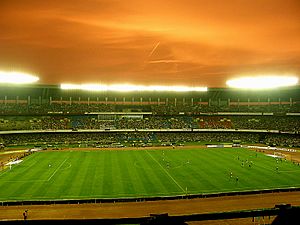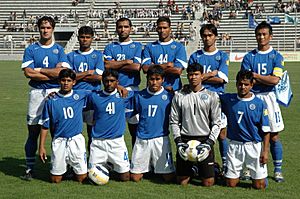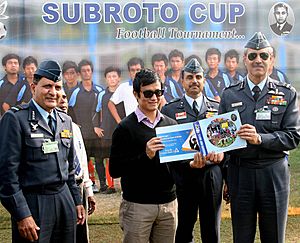Bhaichung Bhutia facts for kids
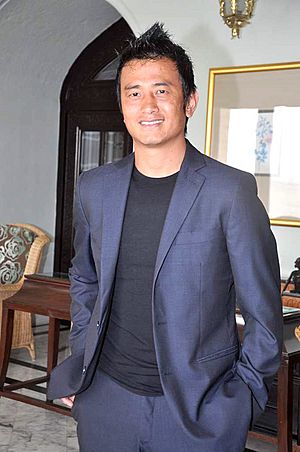
Bhutia in 2012
|
|||||||||||||||||||||||||||||||
| Personal information | |||||||||||||||||||||||||||||||
|---|---|---|---|---|---|---|---|---|---|---|---|---|---|---|---|---|---|---|---|---|---|---|---|---|---|---|---|---|---|---|---|
| Full name | Bhaichung Bhutia | ||||||||||||||||||||||||||||||
| Date of birth | 15 December 1976 | ||||||||||||||||||||||||||||||
| Place of birth | Tinkitam, Sikkim, India | ||||||||||||||||||||||||||||||
| Height | 1.73 m (5 ft 8 in) | ||||||||||||||||||||||||||||||
| Position(s) | Striker | ||||||||||||||||||||||||||||||
| Senior career* | |||||||||||||||||||||||||||||||
| Years | Team | Apps | (Gls) | ||||||||||||||||||||||||||||
| 1993–1995 | East Bengal | 9 | (17) | ||||||||||||||||||||||||||||
| 1995–1997 | JCT | 20 | (15) | ||||||||||||||||||||||||||||
| 1997–1999 | East Bengal | 31 | (15) | ||||||||||||||||||||||||||||
| 1999–2002 | Bury | 37 | (8) | ||||||||||||||||||||||||||||
| 2002–2003 | Mohun Bagan | 11 | (6) | ||||||||||||||||||||||||||||
| 2003 | → Perak (loan) | 8 | (4) | ||||||||||||||||||||||||||||
| 2003–2005 | East Bengal | 38 | (21) | ||||||||||||||||||||||||||||
| 2005 | Selangor MK Land | 5 | (3) | ||||||||||||||||||||||||||||
| 2005–2006 | East Bengal | 16 | (12) | ||||||||||||||||||||||||||||
| 2006–2009 | Mohun Bagan | 45 | (19) | ||||||||||||||||||||||||||||
| 2009–2011 | East Bengal | 3 | (2) | ||||||||||||||||||||||||||||
| 2012–2013 | United Sikkim | 3 | (1) | ||||||||||||||||||||||||||||
| 2015 | East Bengal | 0 | (0) | ||||||||||||||||||||||||||||
| Total | 227 | (128) | |||||||||||||||||||||||||||||
| International career | |||||||||||||||||||||||||||||||
| 1992–1996 | India U23 | 4 | (3) | ||||||||||||||||||||||||||||
| 1995–2011 | India | 84 | (27) | ||||||||||||||||||||||||||||
| Managerial career | |||||||||||||||||||||||||||||||
| 2012 | United Sikkim | ||||||||||||||||||||||||||||||
| 2018 | Sikkim | ||||||||||||||||||||||||||||||
|
Medal record
|
|||||||||||||||||||||||||||||||
| *Club domestic league appearances and goals | |||||||||||||||||||||||||||||||
Bhaichung Bhutia, born on December 15, 1976, is a famous Indian former professional football player. He was known for being a great striker, scoring many goals. Many people see him as the person who brought Indian football to the world stage. He was often called the Sikkimese Sniper because he was so good at shooting the ball into the net. Another famous Indian footballer, I. M. Vijayan, once said Bhutia was "God's gift to Indian football."
Bhutia played for East Bengal FC four times, which was the club where he started his career. In 1999, he made history by joining the English club Bury. This made him the first Indian footballer to sign a contract with a European club. He was also only the second Indian to play professionally in Europe. He also played for other Indian clubs like JCT Mills and Mohun Bagan.
Internationally, Bhutia helped India win many important tournaments. These include the Nehru Cup, LG Cup, and the SAFF Championship three times. He also won the AFC Challenge Cup. He is India's second most capped player, meaning he played the second highest number of games for the national team. He scored his first international goal at 18 years old, making him India's second youngest goal scorer.
Outside of football, Bhutia won a popular TV dance show called Jhalak Dikhhla Jaa. He also became the first Indian athlete to refuse to carry the Olympic torch. He did this to support the Tibetan independence movement. A football stadium is named after him, which is a big honor. He has also received important awards like the Arjuna Award and the Padma Shri.
In 2010, Bhutia started the Bhaichung Bhutia Football Schools in Delhi. He retired from international football in 2011. His last match for the Indian national team was in 2012 against Bayern Munich. After retiring, he also tried his hand at politics and became the president of the Sikkim Football Association.
Contents
Early Life and Football Start
Bhaichung Bhutia grew up in a farming family in Sikkim. His parents were farmers and did not originally want him to play sports. After his father passed away, his uncle, Karma Bhutia, encouraged him. Bhaichung then started school at St. Xavier's School in Pakyong, Sikkim.
When he was nine, he won a football scholarship from the SAI. This allowed him to attend the Tashi Namgyal Academy in Gangtok. Bhutia played for several schools and local clubs in Sikkim. His uncle Karma managed one of these clubs, the Gangtok-based Boys Club.
His amazing performance at the 1992 Subroto Cup caught everyone's attention. He won the "Best Player" award there. A former India goalkeeper, Bhaskar Ganguly, saw his talent. He helped Bhutia move to play football in Kolkata. Besides football, Bhutia also played badminton, basketball, and ran track for his school.
Club Career Highlights
Playing in Kolkata and Europe
In 1993, at just 16 years old, Bhutia left school. He joined the professional East Bengal F.C. club in Kolkata. Two years later, he moved to JCT Mills in Phagwara. This team went on to win the India National Football League in the 1996–97 season. Bhutia was the top goal scorer in the league that year. He was also chosen to play for the Indian national team for the first time in the Nehru Cup. In 1996, he was named "Indian Player of the Year."
In 1997, Bhutia returned to East Bengal. He made history by scoring the first hat-trick in a big local game. This was between East Bengal and Mohun Bagan in the 1997 Federation Cup semi-final. East Bengal won that game 4–1. He became the team captain in the 1998–99 season. That year, East Bengal finished second in the league. In 1999, he received the Arjuna Award. This award is given by the Indian government to athletes for their "outstanding achievements."
Time with Bury FC
Bhutia had a special chance to play football overseas. On September 30, 1999, he went to England to play for Bury F.C. in Greater Manchester. He was only the second Indian footballer to play professionally in Europe. He also became the first Indian to sign a contract with a European club.
He signed a three-year contract with Bury. Bhutia had some trouble getting his visa. So, he could not play his first game until October 3, 1999, against Cardiff City. He scored his first goal in the English league on April 15, 2000, against Chesterfield. A knee injury limited his playing time in his last season at Bury. He left the club in 2002.
Coming Back to India
In 2002, Bhutia came back to India and joined Mohun Bagan. However, he got injured early in the season. He could not play for the rest of that year.
After that, Bhutia returned to East Bengal Club again. He helped them win the ASEAN Club Championship in 2003.
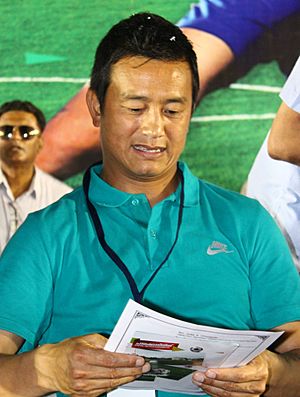
He scored a goal in the final match, which East Bengal won 3–1. He was named the "man of the match" for his great play. He was also the top scorer of the championship with nine goals. He continued to play for East Bengal until 2006. In his last season there, he was named "Player of the National Football League."
Playing in Malaysia Again
In 2005, Bhutia signed with another Malaysian club, Selangor MK Land. He played only five games there because the club had money problems.
Return to Mohun Bagan
On June 15, 2006, Bhutia joined Mohun Bagan. He played alongside Jose Ramirez Barreto. The 2006–07 season was tough for both Bhutia and Mohun Bagan. In the 2007–08 season, Bhutia scored 10 goals in 18 matches. Mohun Bagan finished fourth in the league.
Bhutia won the Indian Player of the Year award for the second time in 2008. This made him only the second player to win it more than once. In the 2008–09 season, Mohun Bagan finished second in the league. Bhutia scored six goals that season.
In 2009, Bhutia announced he would leave Mohun Bagan. This was because the club questioned his dedication to football. He said he would not play for them anymore.
Fourth Time with East Bengal
Bhutia officially signed with East Bengal again on June 22, 2009. He said he wanted to finish his playing career at the club. He called it his "homecoming." There was a disagreement with Mohun Bagan about his contract. This issue was eventually resolved.
Bhutia was injured in the months leading up to the 2011 AFC Asian Cup. He believed he would return to play after a break. He always said he would retire from East Bengal if he decided to quit.
United Sikkim and Final East Bengal Stint
In 2012, Bhutia joined United Sikkim as a player and coach. On February 12, 2015, it was announced that Bhutia would return to East Bengal for a short time. He wanted to retire from professional football while wearing the East Bengal colors one last time. However, due to a knee injury, he realized he could not play in the top league. He then announced he would not play club football again.
International Career for India
Bhaichung played his first senior international game for India on March 10, 1995. He was 19 years old and played against Thailand. He scored against Uzbekistan in the 1995 Nehru Cup. This made him India's youngest goal scorer at the time.
In the 1997 SAFF Championship, India beat the Maldives 5–1 in the final. Bhutia scored one of the goals. Two years later, in 1999, India won the tournament again. They beat Bangladesh 2–0 in the final, and Bhutia scored the second goal. He was named the tournament's most valuable player.
He also scored two goals in the final of the 2002 LG Cup in Vietnam. India won that match 3–2. In the 2007 Nehru Cup, Bhutia scored a penalty in a 6–0 win over Cambodia. He also scored in wins against Bangladesh and Kyrgyzstan. Bhutia played a key role in the final, helping India win 1–0 against Syria to become champions.
In the 2005 SAFF Championship, Bhutia was the captain. He scored a goal in a 3–0 win over Bhutan. India reached the final and beat Bangladesh 2–0. Bhutia scored the second goal. He received awards for Most Valuable Player and Fair Play. In the 2008 SAFF Championship, Bhutia scored in a 4–0 win over Nepal.
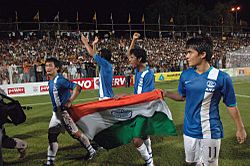
He scored twice in a 2–1 victory against Turkmenistan in the 2008 AFC Challenge Cup. This helped India reach the semi-finals. He scored a goal in the final against Tajikistan. India won 4–1, which meant they automatically qualified for the 2011 AFC Asian Cup. Bhutia was named the most valuable player of the tournament.
The 2009 Nehru Cup was very important for Bhutia. He played his 100th game for India in a 2–1 win over Kyrgyzstan. This made him the first Indian player to reach 100 international games. He also scored the first goal in that match. He was named "Player of the Tournament" for his excellent performances.
At the 2011 AFC Asian Cup in Qatar, Bhutia was injured for the first two games. He played as a substitute against South Korea, but India lost 4–1 and was eliminated. Soon after, on August 24, 2011, he announced his retirement from international football. He ended his career with 40 goals in 104 games for India.
Farewell Match
Bhaichung Bhutia played his farewell match for the Indian national team on January 10, 2012. It was a friendly game against the famous German club Bayern Munich. The match took place at the Jawaharlal Nehru Stadium in New Delhi. About 30,000 fans came to watch this special event. Bayern Munich won the match 4–0.
Managerial Roles
On November 13, 2012, Bhutia became the temporary manager of United Sikkim. He took over after the club had a big loss in an I-League match. In January 2018, he was appointed the manager of the Sikkim team for the Santosh Trophy.
Other Activities
Entertainment and TV
In 2009, Bhutia won the third season of Jhalak Dikhhla Jaa. This is the Indian version of the TV show Dancing with the Stars. He won 4 million Indian Rupees. Bhutia gave half of his prize money to charity. He also shared some with his dance partner. He said some money would go to areas affected by a cyclone.
Politics and Social Causes
In 2014, Bhutia joined the Trinamool Congress political party. He ran for election in the 2014 Indian general election but did not win. In 2018, he started his own political party called "Hamro Sikkim Party".
Bhutia comes from a Buddhist family. However, he considers himself an atheist. He married Madhuri Tipnis in 2004, and their marriage ended in 2015. He has three children, two girls and one boy.
The government of Sikkim built a stadium, the Bhaichung Stadium, in his honor. This shows how much he has contributed to Indian football. He is a very popular person in Sikkim and an inspiration to many. In 2008, he received the Padma Shri award. This is one of India's highest civilian awards.
In 2008, Bhutia was asked to carry the Olympic torch in India. But he refused to carry it. He did this to show his support for the Tibetan independence movement. He was the first Indian sportsman to refuse to carry the Olympic torch. He said he sympathized with the Tibetan cause.
In 2011, Bhutia was in the Sikkim earthquake. He was not hurt, but his United Sikkim FC offices were destroyed. After the earthquake, he worked with Bollywood actors to raise money for the victims.
Football Schools and Foundations
On October 28, 2010, Bhutia started the Bhaichung Bhutia Football Schools in Delhi. He partnered with football coach Carlos Queiroz for this project. These schools aim to train young football players.
Bhutia also started a group called the "Indian Sports Foundation" in 2009. This foundation helps footballers who have serious injuries. He is also the president of the Football Players' Association of India (FPAI). This group works to ensure fair treatment for Indian footballers.
Career Statistics
| National team | Year | Apps | Goals |
|---|---|---|---|
| India | 1995 | 7 | 2 |
| 1996 | 5 | 1 | |
| 1997 | 8 | 4 | |
| 1998 | 7 | 0 | |
| 1999 | 4 | 4 | |
| 2000 | 1 | 0 | |
| 2001 | 5 | 2 | |
| 2002 | 2 | 0 | |
| 2003 | 1 | 0 | |
| 2004 | 5 | 0 | |
| 2005 | 5 | 2 | |
| 2006 | 7 | 1 | |
| 2007 | 7 | 3 | |
| 2008 | 12 | 5 | |
| 2009 | 5 | 3 | |
| 2010 | 2 | 0 | |
| 2011 | 1 | 0 | |
| Total | 84 | 27 | |
- Scores and results list India's goal tally first
| No. | Date | Venue | Opponent | Score | Result | Competition |
|---|---|---|---|---|---|---|
| 1 | 29 March 1995 | Sugathadasa Stadium, Colombo | 1–0 | 2–2 | 1995 SAFF Championship | |
| 2 | 2–0 | |||||
| 3 | 6 March 1996 | National Stadium, Bukit Jalil, Kuala Lampur | 2–5 | 2–5 | 1996 Asian Cup qualifier | |
| 4 | 11 April 1997 | Nehru Stadium, Cochin | 1–2 | 1–2 | 1997 Nehru Cup | |
| 5 | 7 September 1997 | Dasarath Rangasala Stadium, Kathmandu | 3–0 | 3–0 | 1997 SAFF Championship | |
| 6 | 9 September 1997 | Dasarath Rangasala Stadium, Kathmandu | 1–0 | 2–2 | 1997 SAFF Championship | |
| 7 | 13 September 1997 | Dasarath Rangasala Stadium, Kathmandu | 2–0 | 5–1 | 1997 SAFF Championship | |
| 8 | 26 April 1999 | Fatorda Stadium, Margao | 1–0 | 2–0 | 1999 SAFF Championship | |
| 9 | 2–0 | |||||
| 10 | 29 April 1999 | Fatorda Stadium, Margao | 1–0 | 2–1 | 1999 SAFF Championship | |
| 11 | 1 May 1999 | Fatorda Stadium, Margao | 2–0 | 2–0 | 1999 SAFF Championship | |
| 12 | 15 April 2001 | Bangalore Stadium, Bangalore | 1–1 | 1–1 | 2002 World Cup qualifier | |
| 13 | 20 May 2001 | Bangalore Stadium, Bangalore | 3–0 | 5–0 | 2002 World Cup qualifier | |
| 14 | 10 December 2005 | Peoples Football Stadium, Karachi | 1–0 | 3–0 | 2005 SAFF Championship | |
| 15 | 17 December 2005 | Peoples Football Stadium, Karachi | 2–0 | 2–0 | 2005 SAFF Championship | |
| 16 | 18 February 2006 | Hong Kong Stadium, Wan Chai | 2–2 | 2–2 | Friendly | |
| 17 | 17 August 2007 | Ambedkar Stadium, New Delhi | 2–0 | 6–0 | 2007 Nehru Cup | |
| 18 | 20 August 2007 | Ambedkar Stadium, New Delhi | 1–0 | 1–0 | 2007 Nehru Cup | |
| 19 | 26 August 2007 | Ambedkar Stadium, New Delhi | 1–0 | 3–0 | 2007 Nehru Cup | |
| 20 | 3 June 2008 | Rasmee Dhandu Stadium, Malé | 2–0 | 4–0 | 2008 SAFF Championship | |
| 21 | 22 July 2008 | Lal Bahadur Shastri Stadium, Hyderabad | 1–0 | 1–1 | Friendly | |
| 22 | 3 August 2008 | Gachibowli Athletic Stadium, Hyderabad | 1–0 | 2–1 | 2008 AFC Challenge Cup | |
| 23 | 2–0 | |||||
| 24 | 13 August 2008 | Ambedkar Stadium, New Delhi | 2–0 | 4–1 | 2008 AFC Challenge Cup | |
| 25 | 14 January 2009 | Hong Kong Stadium, Wan Chai | 1–1 | 1–2 | Friendly | |
| 26 | 23 August 2009 | Ambedkar Stadium, New Delhi | 1–0 | 2–1 | 2009 Nehru Cup | |
| 27 | 26 August 2009 | Ambedkar Stadium, New Delhi | 1–0 | 3–1 | 2009 Nehru Cup |
Awards and Achievements
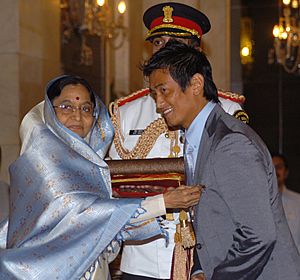
East Bengal
- ASEAN Club Championship: 2003
- National Football League: 2003–04
- Federation Cup: 2009–10, 2010
- Indian Super Cup: 2011
- Calcutta Football League: 1993, 1995, 1998, 1999, 2003, 2004, 2006, 2010, 2011
- IFA Shield: 1994, 1995, 1997
- Wai Wai Cup: 1993
- San Miguel International Cup: 2004
Mohun Bagan
- Calcutta Football League: 2007, 2008, 2009
- IFA Shield: 2003
- Federation Cup: 2006, 2008
Bengal
- Santosh Trophy: 1995, 1998–99
India
- AFC Challenge Cup: 2008
- SAFF Championship: 1997, 1999, 2005; runner-up: 1995, 2008
- Nehru Cup: 2007, 2009
- South Asian Games gold medal: 1995
- Afro-Asian Games silver medal: 2003
India U23
- LG Cup: 2002
Individual
- AIFF Player of the Year: 1995, 2008
- Arjuna Award: 1998
 Padma Shri: 2008
Padma Shri: 2008- AFC Challenge Cup Most Valuable Player: 2008
- Banga Bhushan: 2014
- Asian Football Hall of Fame: 2014
- IFFHS 48 Football Legend Players: 2016
- ASEAN Club Championship Top Scorer: 2003
- Sportskeeda All time Indian Football XI
See also
 In Spanish: Bhaichung Bhutia para niños
In Spanish: Bhaichung Bhutia para niños
- AIFF Player of the Year
- Asian Football Hall of Fame inductees
- List of India national football team captains
- Bhaichung Stadium
- Politics and sports
- List of Indian football players in foreign leagues


